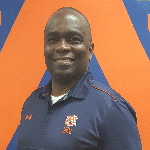 After devoting nearly a quarter of a century to military service, Darryl Walker says he found it hard to leave. So he took an unconventional path back into service — he’s now a human resources generalist at the Army Cadet Command at Auburn University, where he puts his PHR certification to great use.
After devoting nearly a quarter of a century to military service, Darryl Walker says he found it hard to leave. So he took an unconventional path back into service — he’s now a human resources generalist at the Army Cadet Command at Auburn University, where he puts his PHR certification to great use.
We spoke with Darryl about the joys and challenges of military careers, the benefits of certification for a military career and his vision for the future of HR.
I was an active enlisted soldier for 24 years, and my military occupational specialty was a paratrooper. As you can imagine, I’m used to big jumps, but the transition to HR was a pretty big leap. It was hard moving from such an active, physical lifestyle to the physically passive work of administrative HR. Stepping into an administrative role was a bit of a learning curve, but it was a great step for my career.
My bachelor's degree is in human resource management so that definitely helped me to acclimate. Army HR was still a big transition though — there are definitely differences between military and civilian HR. My certifications definitely helped get me where I am now in my role with the ROTC, and I love being in both a military and a university setting. It allows me to see two sides of HR.
I see how the U.S. Army adapts to meet training and how Auburn University changes processes to meet staffing throughout the university. U.S. Army Cadet Command adopted a Talent Management site to allow Cadets to choose the correct job matched to their personal and physical capabilities. On the Auburn side, I get to see how the University rolled out their online onboarding process. It’s a far cry from being a paratrooper, but I love the learning I do along the way.
Credentials play a huge role in the military, and after I switched to HR, I noticed that the industry had its own credentialing system. An investigation into what those credentials entailed led me to the HRCI. I wanted to gain that credibility for my own practice, so I took the plunge.
I took the course through the Army. I initially started with the aPHR, but after passing I felt compelled to level up to the PHR. The coursework is tough, so passing that exam was amazing. I was ecstatic when I passed. My study process was really meticulous — and it had to be. Certification isn’t something you can do casually. You’re investing in your career and goals. It’s strenuous work, but the payoff is more than worth it.
A lot of people don’t realize that certifications can play a role in military service, but they absolutely do. My goal in getting the certification was actually to set myself up for a promotion — which I achieved — and to be considered as a professional in my field.
The certification is hugely validating in the HR space. Given my newly acquired PHR certification, I hope to seek other positions with the Army. Most people don’t make the connection between certification and the military, but HR is essential in military operations, and certification is a huge factor in moving up.
I now have a foundation of knowledge to further my company’s goals, assist co-workers with issues and to grow personally. My confidence went through the roof when I passed the test. I was so proud of myself for completing the course. Having the knowledge and being able to apply it to the ROTC population — and beyond — is a substantial gain.
I would recommend certification, without question. The PHR opens up so many opportunities for job growth. It’s also great if you need a push to move forward in your practice of HR. Also — and maybe this is my military background talking again — I feel like if I'm in a certain field, I need to be fully certified in that field. I’m already planning to take the SPHR in the future.